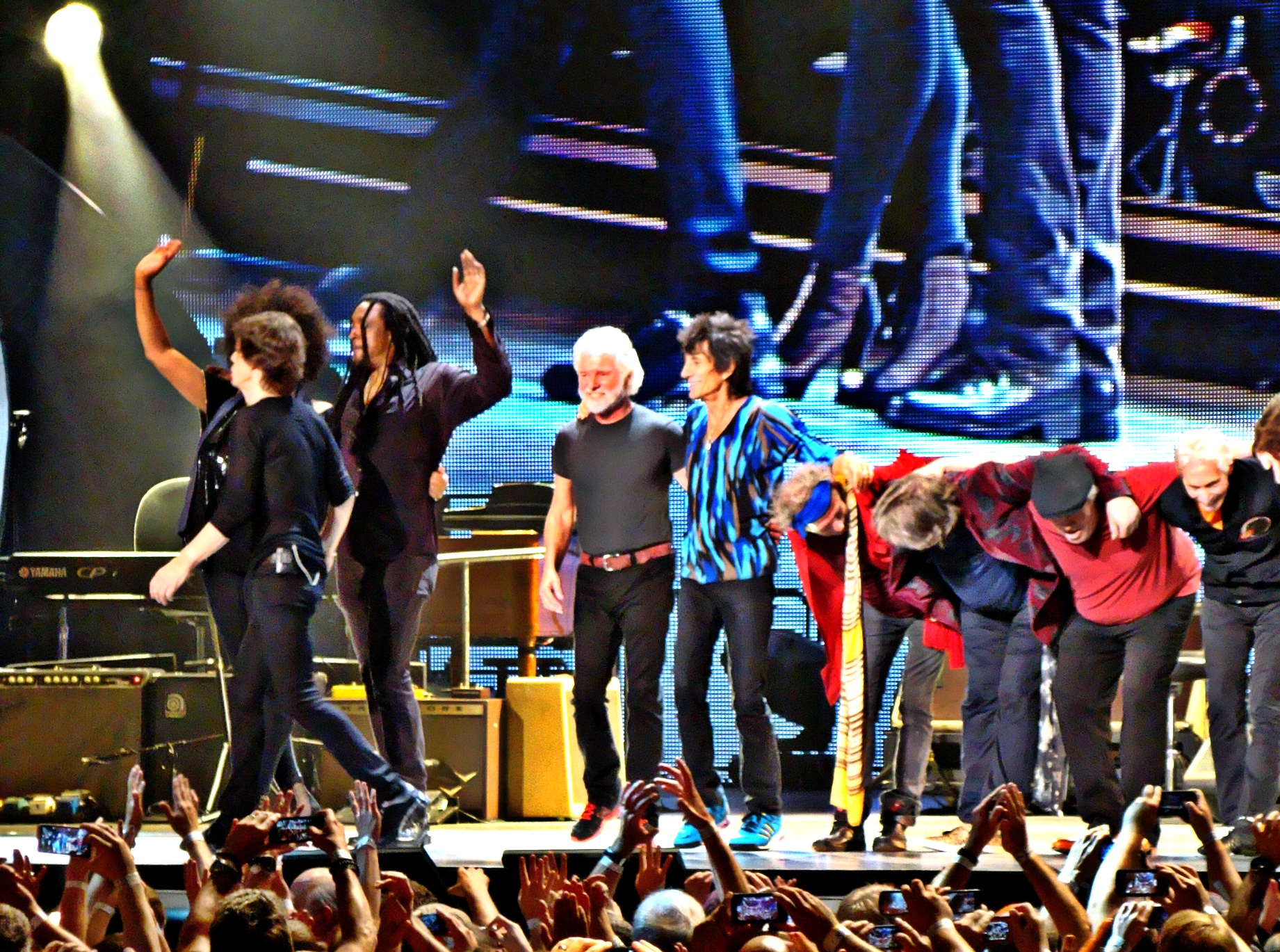What's It Like to Play for the Rolling Stones?
This is the final post in my series about Chuck Leavell, the Rolling Stones Musical Navigator.

 Deutsche Version s. unten
Deutsche Version s. unten
So far we've explored Chuck Leavell's work with the Allman Brothers, Sea Level, Eric Clapton, George Harrison, and John Mayer. (To see earlier posts click on highlighted links)
These are only a few career highlights. To learn more read my career retrospective interview with him for AllAboutJazz, “The Magic of Finger Painting.”
In this final post we look at Chuck's connection to the Rolling Stones. When Chuck quit the Allman Brothers Band to form the band Sea Level, the ABB played legal hardball. In the introduction to my interview I wrote about how his work with the Stones changed his life :
“Leavell found himself plagued by debts, lawsuits, acrimony and existential angst; wondering how he would provide for his wife and daughter. During this very bleak period, he was contacted by Ian Stuart, who invited him to audition for a spot on the Rolling Stones tour. For more than a quarter of a century, Chuck has remained with the Stones, taking on the role of musical navigator when Stuart died in late 1985. Keith Richards has said: "Chuck is our direct link to Stu. Without that continuity, the Stones would not be the Stones." Leavell covers his work with the Stones very thoroughly in his excellent autobiography, Between Rock and a Home Place.”
If you're not familiar with the Stones history, Ian Stuart was a keyboardist and co-founder of the Rolling Stones who was fired by their manager who felt his image didn't fit the band. Ian stayed on as road manager and pianist for the Stones.

Although I interviewed Chuck a couple of times, I purposefully did not spend much time on the Rolling Stones. First, he is asked those same questions constantly. Secondly, he is such a tremendous player, in his work outside of the Stones is where his playing is on display. Nonetheless, it is a dream gig for a musician. The Stones tour schedule is not so demanding and allows him to pursue outside projects. He tours like a rock star and one assumes he does quite well financially. Unlike the Stones themselves, he isn't the prison of “fame.” When he tours these exotic locations, he is able to move around like a regular person. Finally, being in the inner-circle of the Stones opens lots of doors.
In my interviews I generally don't ask want to ask question that put someone in an uncomfortable situation, or provoke them. But when I asked Chuck about his work with the Rolling Stones, I did ask probing questions, and his answers were refreshingly honest.
My Questions to Chuck Leavell about the Rolling Stones
Alan Bryson: I thought Martin Scorsese did a fine job on the film Shine a Light. During the opening black-and-white scenes you are seen in your central role as musical navigator, but during the on-stage portion you only see Mick, Keith, Ronnie and Charlie and the background singers. Why was that? Did the camera for the keyboards malfunction?
Behind the Scenes Bonus Material
Chuck Leavell: Every film done on the Rolling Stones is ninety percent Mick Jagger. That's just the way they operate, and you know that going in. We all knew that there would be little of us on screen other than what incidental things might come up. You'd love to have more camera time, and I was pleased they did a remix. I'll give you a story on this. After the first cut, Scorsese and his team came to Rome when we were touring, and we rented a theater and went in and watched it. I'm sure all of us, myself included, were disappointed in some aspects of it. It's so much the principals, especially Mick, and very little of anything else in terms of the camera, and also the mix. It's like the rest of us just don't exist.
And so I went to Mick and I said, "Listen, you haven't asked me, but here's my comments on the film and on the audio mix." I literally typed it out in a four page letter to him. All the comments were specific, from this song to that song, the camera angles, and especially the audio mix. I don't know whether it made any difference or not, but I can tell you that I was pleased that in the final cut at least the audio mix was much better balanced that what we heard in Rome, and I feel pretty good about that. As for the camera thing, it's like I said—every film they've ever done has been that way. I think it's unfortunate because there's so much more to the Rolling Stones. It's not just me—how many shots of Bobby Keys do you see in that film, and how many shots of the horn players? They may get a total of three seconds of camera time in a two hour film.
Alan Bryson: I think serious Stones fans were probably a little bit disappointed.
Chuck Leavell I think it is so much deeper and more interesting than that but, you know, that's their way.
Alan Bryson: I know Keith has said that the Stones are a guitar band. It's also a major musical enterprise with a fan base that has pretty clear expectations that must be respected when performing. I'm curious, though, when you guys are off somewhere rehearsing with no audience to please and egos more or less in check, are there times when they aren't the “Stones” and you all are simply musicians jamming the blues and relating to each other like you did when you were a kid back in Alabama?
Chuck Leavell: Oh, sure there are. Man, that goes on all the time, and I think there are also documented events—listen to “Losing My Touch” on Forty Licks (Virgin, 2002). That's very unlike the Stones and very Keith like and it certainly gives me some good space to play.
And when you listen to the Stripped (Virgin, 1995) record, that's another example of when they take the focus a little bit down from the principals and you hear a little more of a band sound, and even on Shine a Light (Interscope, 2008), when you listen to the audio soundtrack you can hear us there. Yeah, those moments happen.
 Deutsche Version s. unten
Deutsche Version s. unten

Dies ist der letzte Post in meiner Serie über Chuck Leavell, den Rolling Stones Musical Direktor.
In diesem letzten Beitrag betrachten wir Chucks Verbindung zu den Rolling Stones. In der Einleitung zu meinem Interview schrieb ich darüber, wie seine Arbeit mit den Stones sein Leben veränderte (die Allman Brothers Band hatte juristische Schwierigkeiten gemacht, als Chuck die Band Sea Level gründete):
"Leavell befand sich in existentieller Angst: Schulden, Rechtsklagen, Verbitterung und das Problem wie er als Musiker für seine Frau und seine Tochter sorgen sollte. Während dieser sehr düsteren Periode wurde er von Ian Stuart kontaktiert, der ihn dazu einlud, für die Rolling Stones Tour vorzuspielen. Nun ist es bereits mehr als ein Vierteljahrhundert, seitdem Ian Stuart (Ende 1985) starb, und Chuck die Rolle des musikalischen „Navigators“ übernahm. Keith Richards hat gesagt: 'Chuck ist unser direkter Link zu Stu. Ohne diese Kontinuität wären die Stones nicht die Stones.' Leavell beschreibt sehr ausführlich seine Arbeit mit den Stones in seiner ausgezeichneten Autobiographie, Between Rock and a Home Place."
Wenn du nicht mit der Geschichte der Stones vertraut bist, Ian Stuart war ein Keyboarder und Mitbegründer der Rolling Stones, der von ihrem Manager gefeuert wurde. Er dachte, dass er nicht zu dem Image der Band paßte. Ian blieb als „Road-Manager“ und Pianist für die Stones.

Obwohl ich Chuck ein paar Mal interviewt habe, habe ich nicht viel Fragen über die Rolling Stones gestellt. Erstens werden ihm ständig die gleichen Fragen gestellt. Zweitens ist er so ein großartiger Musiker, was bei seiner Arbeit außerhalb der Stones eher zum Vorschein kommt.
Der Stones Tour Zeitplan erlaubt ihm, seine eigenen Projekte zu verfolgen. Er tourt wie ein Rockstar und man geht davon aus, dass er ganz gut dafür belohnt wird. Im Gegensatz zu den Stones selbst, muss er sich aber nicht in den Hotels verstecken, sondern kann sich die schönsten Orte und Städte unbelästigt und unbeschwert ansehen. Dennoch öffnen sich ihm durch die Beziehung mit den Stones viele Türen.
In meinen Interviews habe ich in der Regel niemanden in eine unangenehme Situation bringen wollen, oder provozieren wollen. Aber als ich Chuck über seine Arbeit mit den Rolling Stones fragte, gab es ein Paar heikle Fragen, und seine Antworten waren erfrischend ehrlich.
Meine Fragen an Chuck Leavell über die Rolling Stones
Alan Bryson: Ich dachte, Martin Scorsese hat einen guten Job bei dem Film Shine a Light gemacht. Während der Eröffnungs-Schwarz-Weiß-Szenen bist du in deiner zentralen Rolle als musikalischer Navigator zu sehen, aber auf der Bühne sieht man nur Mick, Keith, Ronnie und Charlie und die Hintergrundsänger. Warum war das so?
Chuck Leavell: Jeder Film, der von den Rolling Stones gemacht wird, ist neunzig Prozent Mick Jagger. So funktioniert das, und das weiß man von vornherein. Wir wussten alle, dass wir kaum auf der Leinwand erscheinen würden, außer durch Zufallsaufnahmen... ich war froh, dass sie einen Remix gemacht haben. Ich erzähle dir eine Geschichte darüber. Nach dem ersten Schnitt kamen Scorsese und sein Team nach Rom, als wir auf Tour waren. Wir mieteten ein Theater und sahen den Film an. Ich bin mir sicher, dass wir alle, darunter auch ich, in einigen Aspekten enttäuscht waren. Es ist immer das gleiche Schema, die Kamera zeigt die Bandmitglieder, vor allem Mick, aber sehr wenig von uns -- auch im Audiomix. Es ist als ob der Rest von uns einfach nicht existiert.
Und so ging ich zu Mick und sagte: "Hör zu, du hast mich nicht gefragt, aber hier sind meine Kommentare zum Film und zum Audio-Mix." Ich habe es buchstäblich in einem vierseitigen Brief an ihn geschrieben. Alle Kommentare waren spezifisch, von Lied zu Lied, den Kamerawinkel, und insbesondere der Audiomix. Ich weiß nicht, ob es einen Unterschied machte oder nicht, aber ich kann dir sagen, dass ich zufrieden war, dass im letzten Schnitt zumindest der Audio-Mix viel besser ausbalanciert war als das, was wir in Rom gehört haben. Ich bin darüber froh. Was die Kamera betrifft, so ist es, wie ich schon sagte - jeder Film, den sie jemals gemacht haben, war so. Ich finde es schade, denn die Rolling Stones bestehen aus viel mehr als das. Es betrifft nicht nur mich - wie viele Aufnahmen von Bobby Keys (Sax) siehst du in diesem Film und wie viele Aufnahmen der Hornisten? Sie waren in einem zweistündigen Film insgesamt drei Sekunden zu sehen. Ich denke, es ist so viel tiefer und interessanter als was gezeigt wurde, aber du weißt, das ist ihre Vorgehensweise.
Alan Bryson: Ich weiß, Keith hat gesagt, dass die Stones eine Gitarrenband sind. Es ist auch ein großes musikalisches Unternehmen mit unzähligen Fans, die ziemlich klare Erwartungen haben, wessen Wünsche respektiert werden müssen. Mich würde interessieren, wenn ihr ohne Zuschauer probt und die großen Egos in Schach gehalten werden, gibt es da Augenblicke in denen sie nicht die „großen“ Rolling Stones sind, sondern einfach nur Musiker, die Freude am Spiel haben, wie du es als junger Musiker in Alabama erlebt hast?
Chuck Leavell: Oh, sicher, das gibt es. Ich denke, dass es auch dokumentierte Beispiele dafür gibt – hör mal "Losing My Touch" auf Forty Licks. Das ist für die Stones sehr unähnlich und sehr von Keith geprägt – er gibt mir Platz mich musikalisch zu entfalten. Und wenn du die Stripped Platte hörst, ist das ein weiteres Beispiel dafür, wenn der Fokus ein wenig von den Stars abgewandt wird und man hört mehr von dem Band-Sound. Sogar wenn du den Shine a Light Audio-Soundtrack hörst, merkst du das. Ja, diese Momente passieren schon.
Aber Mick hat eine gewisse Vorstellung davon, wer die Rolling Stones sind und wer sie nicht sind. Und er bleibt sehr dran und er wird es nie ändern, und der Fokus wird immer auf ihn und Keith sein. Ronnie Wood hat in letzter Zeit einige schwierige Zeiten gehabt und ich habe kürzlich etwas in der Presse gesehen, wo Mick sagte: "Weißt du, wir werden mit oder ohne ihn touren." Ich verstehe das, aber das gibt einen kleinen Einblick, was und wer für Mick die Rolling Stones sind. Er scheut sich nicht die Leute wissen zu lassen und klar zu machen, dass die Rolling Stones im Grunde Mick und Keith sind. Sie würden auch Charlie miteinbeziehen. Aber sie sind eine kommerzielle Einheit, die, zumindest im gegenwärtigen Augenblick, vier Hauptmitglieder hat.
Alan Bryson: Man kann verstehen, warum sie nicht mit ihrem Erfolgsmodell experimentieren wollen. Aber das Interessante ist, dass du etwas anderes kennst. Keith sagte, dass sie eine Gitarrenband sind. Dennoch waren die Allman Brothers die ultimative Gitarrenband. Als sie dich spielen hörten, baten sie dich, der Band beizutreten. Dann haben sie wegen dir ihren Stil dementsprechend geändert. Somit hast du eine ganz andere Erfahrung gemacht. Du bist mit der erfolgreichsten Rockband aller Zeiten zusammen, aber in Anbetracht dessen, was die Allman Brothers Band getan hat, denke ich, dass dies auch ein großes Kompliment bezüglich deines Talents ist.
Chuck Leavell: Nun, ich weiß das zu schätzen und du hast Recht, und das war natürlich eine ganz andere Situation. Und manchmal beklage ich ganz offen die Tatsache, dass ich mit meiner Rolle bei den Stones nicht in der Lage war, diese Art von Einfluss zu haben. Es gibt viele Aufnahmen die herumliegen, und es gibt auch komplette Songs, die gemacht wurden und nie veröffentlicht wurden, wo ich eine prominente Rolle gespielt habe. Ich hätte gerne einen stärkeren Einfluss auf die Band gehabt, aber es ist ihre Show und sie werden sie so laufen lassen, wie sie es für richtig halten.
Lead Photo is a collage of wiki commons photos with effects by @roused
Second photo from Chuck Leavell, effects by @roused


Yes, it's impossible to imagine the Rolling Stones without Mick. I'm sure most Stones fans share your opinion. Thanks for stopping by!
Congratulations @roused, this post is the fifth most rewarded post (based on pending payouts) in the last 12 hours written by a User account holder (accounts that hold between 0.1 and 1.0 Mega Vests). The total number of posts by User account holders during this period was 1443 and the total pending payments to posts in this category was $2096.56. To see the full list of highest paid posts across all accounts categories, click here.
If you do not wish to receive these messages in future, please reply stop to this comment.
img credz: pixabay.com
Nice, you got a 2.2% @minnowbooster upgoat, thanks to @roused
Want a boost? Minnowbooster's got your back!
The @OriginalWorks bot has determined this post by @roused to be original material and upvoted it!
To call @OriginalWorks, simply reply to any post with @originalworks or !originalworks in your message!
To enter this post into the daily RESTEEM contest, upvote this comment! The user with the most upvotes on their @OriginalWorks comment will win!
For more information, Click Here! || Click here to participate in the @OriginalWorks sponsored writing contest(125 SBD in prizes)!
Special thanks to @reggaemuffin for being a supporter! Vote him as a witness to help make Steemit a better place!
This post recieved an upvote from minnowpond. If you would like to recieve upvotes from minnowponds team on all your posts, simply FOLLOW @minnowpond.
@roused Thank you for your work, I invite you to evaluate my work.